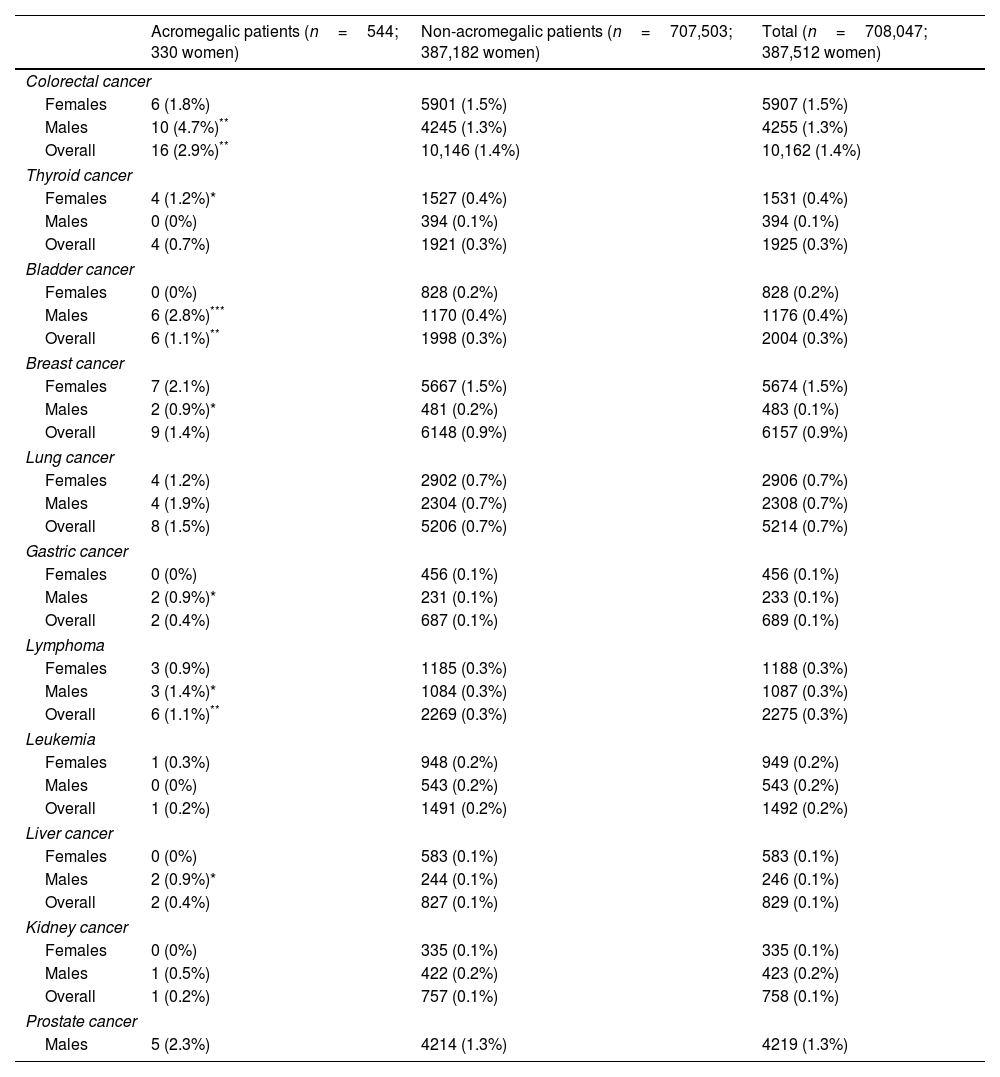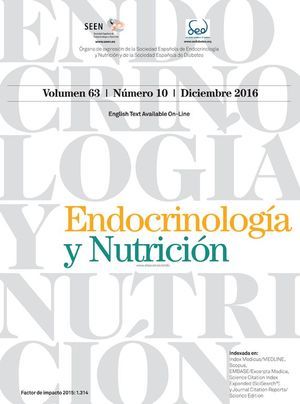To evaluate the association between acromegaly and cancer and different types of cancer by using natural language processing systems and big data analytics.
Material and methodsWe conducted an observational, retrospective study utilizing data from the electronic health records (EHRs) of Hospital Universitario Puerta de Hierro Majadahonda, Madrid, Spain. Information from the EHRs was extracted using artificial intelligence techniques and analyzed using Savana Manager 4.0 software.
ResultsOut of a total of 708,047 registered patients (54.7% females), 544 patients (0.08%; 330 women, 60.7%; mean age at diagnosis 53.0±15.8 yr) were diagnosed with acromegaly. The incidence of cancer was higher in patients with acromegaly vs those without this condition (7.7% vs 3.9%, p<0.001; OR, 2.047, 95%CI, 1.493–2.804). Male acromegalic patients had a higher prevalence of cancer vs females (57.1% vs 42.9%, p=0.012). A significantly higher prevalence of colorectal cancer (2.9% vs 1.4%, p=0.006), bladder cancer (1.1% vs 0.3%, p=0.005), and lymphoma (1.1% vs 0.3%, p=0.009) was observed in patients with acromegaly vs those without the condition. Acromegalic men had significantly higher prevalence rates of colorectal cancer (4.7% vs 1.3%, p=0.001), bladder cancer (2.8% vs 0.4%, p<0.001), breast cancer (0.9% vs 0.2%, p=0.042), gastric cancer (0.9% vs 0.1%, p=0.011), lymphoma (1.4% vs 0.3%, p=0.037), and liver cancer (0.9% vs 0.1%, p=0.012) vs non-acromegalic men. On the other hand, acromegalic women showed a higher prevalence of thyroid cancer (1.2% vs 0.4%, p=0.043) vs non-acromegalic women.
ConclusionOur study, based on artificial intelligence techniques and analysis of real-world data and information, revealed a significant association between acromegaly and cancer in our hospital population, mainly acromegalic men, with a higher frequency of colorectal cancer, bladder cancer and lymphoma in particular.
Evaluar la asociación de la acromegalia con el cáncer y los tipos de cáncer mediante el uso de sistemas de procesamiento de lenguaje natural y análisis de Big Data.
Material y métodosSe realizó un estudio observacional retrospectivo a partir de los datos de las historias clínicas electrónicas (HCE) del Hospital Universitario Puerta de Hierro Majadahonda (España). La información de las HCE se extrajo mediante técnicas de inteligencia artificial y se analizó con el software Savana Manager 4.0.
ResultadosDe un total de 708.047 pacientes registrados (54,7% mujeres), 544 pacientes (0,08%; 330 mujeres [60,7%]; edad media en el momento del diagnóstico 53,0±15,8 años) fueron diagnosticados de acromegalia. La frecuencia de cáncer fue mayor en los pacientes con acromegalia que en los que no la padecían (7,7% vs 3,9%, p<0,001; OR: 2,047; IC95%: 1,493-2,804). Los pacientes acromegálicos varones presentaron una mayor prevalencia de cáncer en comparación con las mujeres (57,1% vs 42,9%, p=0,012). Se observó una prevalencia significativamente mayor de cáncer colorrectal (2,9% vs 1,4%, p=0,006), cáncer de vejiga (1,1% vs 0,3%, p=0,005) y linfoma (1,1% vs 0,3%, p=0,009) en pacientes con acromegalia en comparación con los que no padecían la enfermedad. Los varones acromegálicos presentaron tasas de prevalencia significativamente superiores de cáncer colorrectal (4,7% vs 1,3%, p=0,001), cáncer de vejiga (2,8% vs 0,4%, p<0,001), cáncer de mama (0,9% vs 0,2%, p=0,042), cáncer gástrico (0,9% vs 0,1%, p=0,011), linfoma (1,4% vs 0,3%, p=0,037) y cáncer de hígado (0,9% vs 0,1%, p=0,012) en comparación con los varones no acromegálicos. Por otra parte, las mujeres acromegálicas mostraron una mayor prevalencia de cáncer de tiroides (1,2% vs 0,4%, p=0,043) en comparación con las mujeres no acromegálicas.
ConclusiónNuestro estudio, basado en técnicas de inteligencia artificial y análisis de datos e información del mundo real, reveló una asociación significativa entre acromegalia y cáncer en nuestra población hospitalaria, principalmente en varones acromegálicos, con una mayor frecuencia de cáncer colorrectal, cáncer de vejiga y linfoma en particular.








